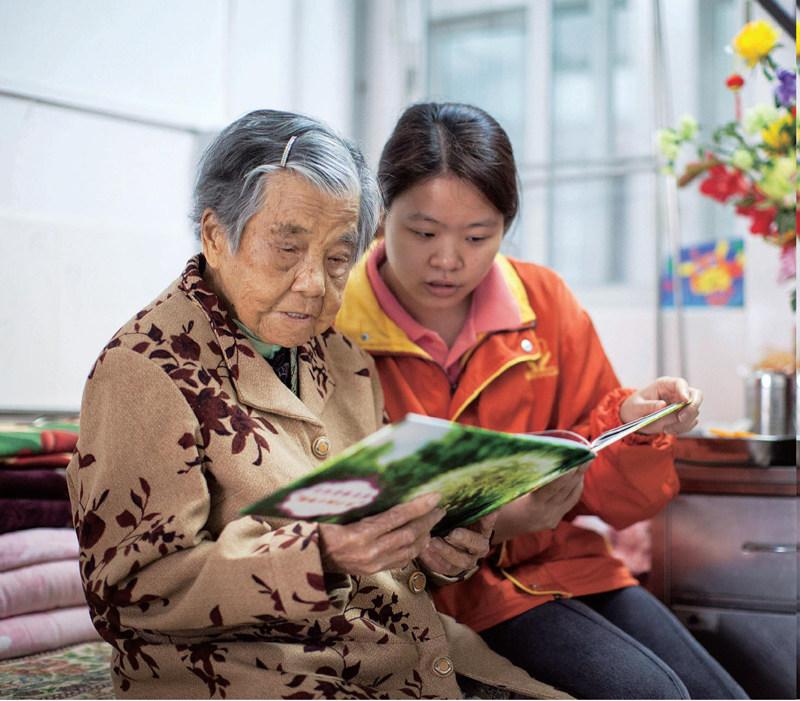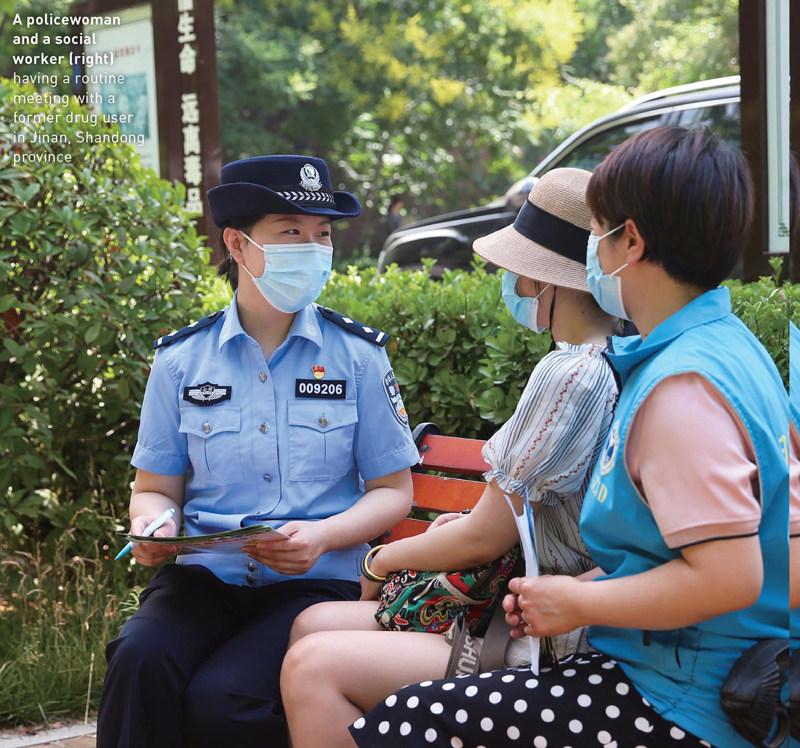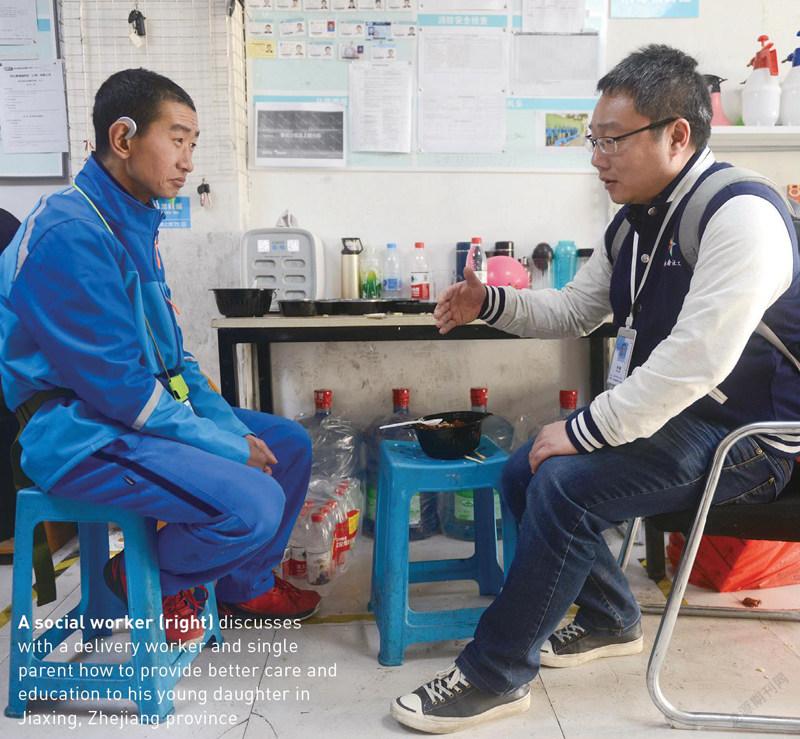A Social Crisis
谢佩璇





Lacking the public’s understanding and autonomy from the government, China’s social workers struggle to make a difference
做職业社工是怎样一种体验?
Five years after she became a professional social worker, ZhengYilin decided to call it a day. She used to be passionate about her work with rehabilitating narcotics users in Guangzhou and Beijing, but thought her decision to quit was “for the best.”
Like many children from her native Guangzhou in China’s southeast, Zheng, who did not want to give her real name, grew up watching TV shows from Hong Kong, which depicted social workers in helpful roles such as training released prisoners to reintegrate into society, referring women living with HIV to clinics, and advocating for basic social protection and dignity for migrant workers. “It was from these TV shows that I got my first exposure to sociological discussions and social work. Those ideas were brand new,” she says. “I remembered seeing social workers doing great things for society and helping others, and I aspired to be like them someday.”
After getting her bachelor’s degree in social work in 2012, Zheng started working at a community center in Guangzhou for reintegrating former drug users into society. Her main tasks included pre-release intervention for drug users; making twice-monthly home visits, or sometimes daily phone calls, to check on their case subjects’ well-being and rehabilitation progress; organizing events to dispel public stigma around drug users; and referring her case subjects to counseling, career training, and other services. She also updated the police and community government office on her clients’ progress.
But the reality of social work turned out to be much different from what Zheng expected from TV. While Hong Kong’s social workers operate in a decentralized system (as in most Western countries), driven by identifying the needs of marginalized populations on the ground, developing participatory solutions to these needs, and pushing lawmakers to address gaps in policies and services for at-risk populations, mainland social workers are meant to compliment public administrators and work under the government’s direct management.
As a consequence, social workers and agencies on the mainland have great financial dependence on public funding and service contracts from government organizations. This, in turn, often requires them to serve government-defined goals, like poverty reduction and health care, instead of on-the-ground problems such as domestic violence, child trafficking, or the drug addiction that Zheng spent years working to alleviate.
“They would ask us, ‘Did the police send you to spy on us?’” Zheng recalls of some of the house visits she made to former drug users. For Zheng, the government-directed nature of social work made it difficult to establish trust with some of her case subjects, who had unpleasant memories of the police.
Whereas clinics, police, and community offices tend to ‘manage and monitor’ drug users, social workers aim to rebuild their social ties. “We need to have a different approach to each case. We don’t nag or order; instead, we show that we care,” says Zheng, who offers the example of chatting with female clients about romantic relationships as a way to start a conversation on reproductive health, or giving a cigarette to a client before broaching a serious topic.
Professional social work got its start in China in the 1980s and 90s, when the Ministry of Civil Affairs (MCA) began developing social worker training programs at universities and government organizations in response to various social problems brought about by rapid urbanization: namely, a large “floating population” of migrant workers cut off from education and social services provided by their hometowns. In 1997, Shanghai’s Pudong district began hiring graduates of social work programs to work within education, health, and civil affairs offices.
Today, due to China’s aging population, the government has identified expanding the social work sector as a long-term goal. A document released by the MCA in 2012 set a target of nearly 1.5 million professional social workers by 2020. As of 2018, the China Association of Social Workers, a nonprofit organization registered under the MCA, documented 439,266 certified social workers around the country, rising from about 43,600 in 2010, and showed an increase in government investment in the sector from 2 billion yuan in 2015 to 6 billion yuan.
But the MCA’s plan explicitly assigns only a supporting role to social work. It states that a fundamental principle for developing the social work sector is to “enhance the leading role of the Communist Party of China and promote the participation of social work organizations in public administration,” with the objective of “contributing to the establishment of a harmonious socialist society.” The document emphasized the need to hire social workers to help with health care, child welfare, elderly care, disability care, community governance, and rural development—all central to the country’s overarching development strategies.
This top-down approach tallied with Zheng’s experiences. “When we start operating in a community, we need to get consent from the local [government] offices. When we do home visits or organize events, we need to have pre-approval from the community office,” she tells TWOC. Social workers in China are employed either in an “administrative” capacity—working within government offices to deliver social services—or a “professional” capacity by specialized agencies registered under the MCA and local bureaus of civil affairs, though government offices may also hire these agencies or make them bid to carry out special projects.
“Local governments will call for contractors for designated projects usually in accordance with bigger [government] plans, like child welfare, migrant worker support, medical social work, or elderly care, and you have a greater chance of winning those bids if you work on those topics,” claims Zheng.
Yet community offices often try to keep social workers at a distance from issues on the ground. “Essentially, community administrators don’t want too many outsiders to interact or build connections with their residents because it might cause trouble,” says Zheng. “We were not allowed to create WeChat groups with our clients, and we have to be accompanied by government workers on home visits, but they are not professional social workers, so often they ask questions in an authoritarian way, and that really undermines the trust we hope to build with our clients.”
Zheng also believes that the “gatekeeper” role of the local government means they sometimes block social work intervention for areas they consider “sensitive.” Drug rehabilitation rarely appears in government-released reports on social work in China, which has some of the strictest drug laws in the world. Drug users are associated with crime, disease, and violence in public discourse, with mainstream news coverage about addiction typically describing how it destroys families, degrades the user’s morals, and threatens “Chinese values.”
A lack of funding sources also limits social workers’ ability to make a difference. Most social work agencies rely on public funds, with even the biggest struggling to get private contributions. Facilitators, one of China’s biggest social work agencies with branches in five provinces across the country, received 70 percent of its budget from government sources in 2020, according to its annual financial report. Grants from international organizations are also restricted, with onerous requirements to report the amount and source of the contribution, while mass fundraising rarely works for causes that are less “mainstream,” according to Zheng.
Likewise, there are limited incentives for talented individuals to take up social work as a career. When Zheng moved to Beijing in 2016, she initially stayed in social work, but saw her salary increase by 40 percent—and her hours lessen—after she left the field and began working in a think-tank for clean energy issues. On China Development Brief, the country’s biggest not-for-profit job website, professional social worker openings in Beijing offer around 5,000 to 7,000 yuan per month in pay, less than the capital’s 7,855 yuan monthly average salary and well below the 11,000 yuan average for civil servants. Monthly pay could go even lower in smaller cities.
This combination of low financial viability and low recognition is contributing to a supply problem in the industry. Latest statistics show that China’s 82 academic institutions that run study programs in social work produce about 40,000 graduates every year. Yan Xia, a second-year graduate student of social work specializing in elderly care at Peking University’s Institute of Population Research, tells TWOC anecdotally that many of her classmates are going into academia, the civil service, public institutions, and even investment banking.
Yan herself is unlikely to pursue a career as a social worker: “My priority will be academia, with health-related jobs as a second choice, and then the social work sector if necessary,” she says. “It’s not a money issue, but I see front-line social workers doing mostly service delivery in China. If I want to get into policy-making for optimizing social work, academia is a better path.”
Understaffing means practicing social workers have to be highly versatile and efficient. Zheng visited eight to ten case subjects each day, for up to 30 minutes each, while there were a few experienced colleagues who juggled more than 30 cases all at the same time. “New social workers generally need at least six months to settle in. If they graduated without enough practical courses, it could take even longer,” admits Zheng.
At the same time, the nature of social work requires commitment and prefers a low turnover. For many social workers working with marginalized populations, such as migrant workers, children with rare diseases, seniors living alone, or, as in Zheng’s case, drug users, building rapport with case subjects might take a long time. Zheng confessed that despite the long hours caused by understaffing and other challenges in their work, more senior staff like her preferred to take on cases themselves than to rely on fresh graduates who would leave after two or three months due to the high workload and low pay.
For Yan, who has done internships as part of her studies, an even bigger challenge than administrative barriers is gaining access to at-need populations due to the public’s lack of understanding of social work. “In my experience, the more difficult part of community-level work is dealing with clients. Many of the elderly and their family members have difficulty accepting the idea of senior homes or collective elder-care programs,” she says.
With the heightened demographic pressure from a rapidly aging population, the government’s call for social work to implement community-based services for the elderly population has become stronger. “In traditional Chinese perceptions, adults bear filial responsibility for taking care of their elderly parents. So often there are perceptual clashes between the elderly, their children, and social workers,” Yan explains. “We have come across situations where family members refused our visits to recommend senior care programs, even though they all have full-time jobs and can’t take care of the old lady themselves.”
Social workers and students also feel the field in China isn’t professional enough. As a latecomer to the subject, China’s social work sector struggles to adapt generic methods and ethics to highly individualized scenarios. “For example, social workers working with elders should be able to see their mobility issues and that elders might be slow to embrace new technologies and ideas,” Yan elaborates. “The same goes for persons with disabilities—physical impairments can be accompanied by barriers in social life and interpersonal relations, and social work should be able to cover such socio-psychological dimensions of disability.”
To fill these gaps, Facilitators, which focuses on migrant worker issues, has attempted to empower those who receive social assistance to later go on and help their peers. “Our work should not be only about making the lives of migrant workers better for a week or a month. Engaging them in our work and training them to become social workers is the way we hope to broaden the impacts,” Li Tao, the founder of Facilitators, reasoned in a seminar attended by TWOC in November 2021.
In 2020, the “Facilitator Class” was formally established and welcomed its first batch of beneficiaries-turned-trainees and aspiring social workers in Beijing. Five former migrant workers were recruited as assistants to professional social workers, taking part in trainings in theoretical and ethical foundations of social work, as well as practical skills in working with targeted groups. Li hopes to expand the program to include tens of thousands of migrant workers.
At the Beijing Facilitators office, Zhang Yanyan, one of the trainees, works on the welfare of the children of migrant workers. A mother and a migrant worker herself, she is in charge of the organization of several nursery programs around Beijing, where social workers and volunteers read, paint, tell stories, and play games with the children, who cannot attend public schools due to the lack of a household registration (), and often have little social interaction with their parents, who work long hours.
By training migrant workers in social work and subjects, such as sociology of childhood, the program is meant to empower recipients of social services to help their own families and communities. “I felt I didn’t have much direction in my life before I met Facilitators. As a mother, I was also not interacting with my children in the best ways. Being trained to be a social worker, instead of just a receiver of services, makes me feel empowered helping people in need and knowing they also have the potential to help others, like I did,” Zhang tells TWOC.
It remains to be seen whether such initiatives are enough to plug the supply gap in the industry, or balance out the problems caused by the top-down nature of social work in China. Yan thinks the administrative hurdles, at least, might be improving. “Many of those working at grassroots level [of government] are not incapable and, normally, not as senior as we might expect. The personnel we’ve worked with are mostly under 35 and have sufficient understanding of social work,” she observes.
Yan envisions a professionalized social work sector to be like a hospital: “On top of the basis that every social worker is professionally trained, we need general practitioners who take care of a bit of everything, and we need those specialized to cover different needs of varied groups. I think this should be the essence of future social work in China.”
Even though she has left the field, Zheng still recalls that one of her case subjects texted her, after months of intervention, that he “feels the sun shines in” whenever Zheng visited him, because she has been cheerful, attentive, and empathetic with constructive suggestions for his life. Later, Zheng found out he stayed clean and was on track to recovery: “These are the kinds of memories that are still precious to me to this day,” she says.
A policewoman and a social worker (right) having a routine meeting with a former drug user in Jinan, Shandong province
A social worker (right) discusses with a delivery worker and single parent how to provide better care and education to his young daughter in Jiaxing, Zhejiang province
Children from a rural relocation program in Guizhou province doing homework in a community center, due to lack of parental care

